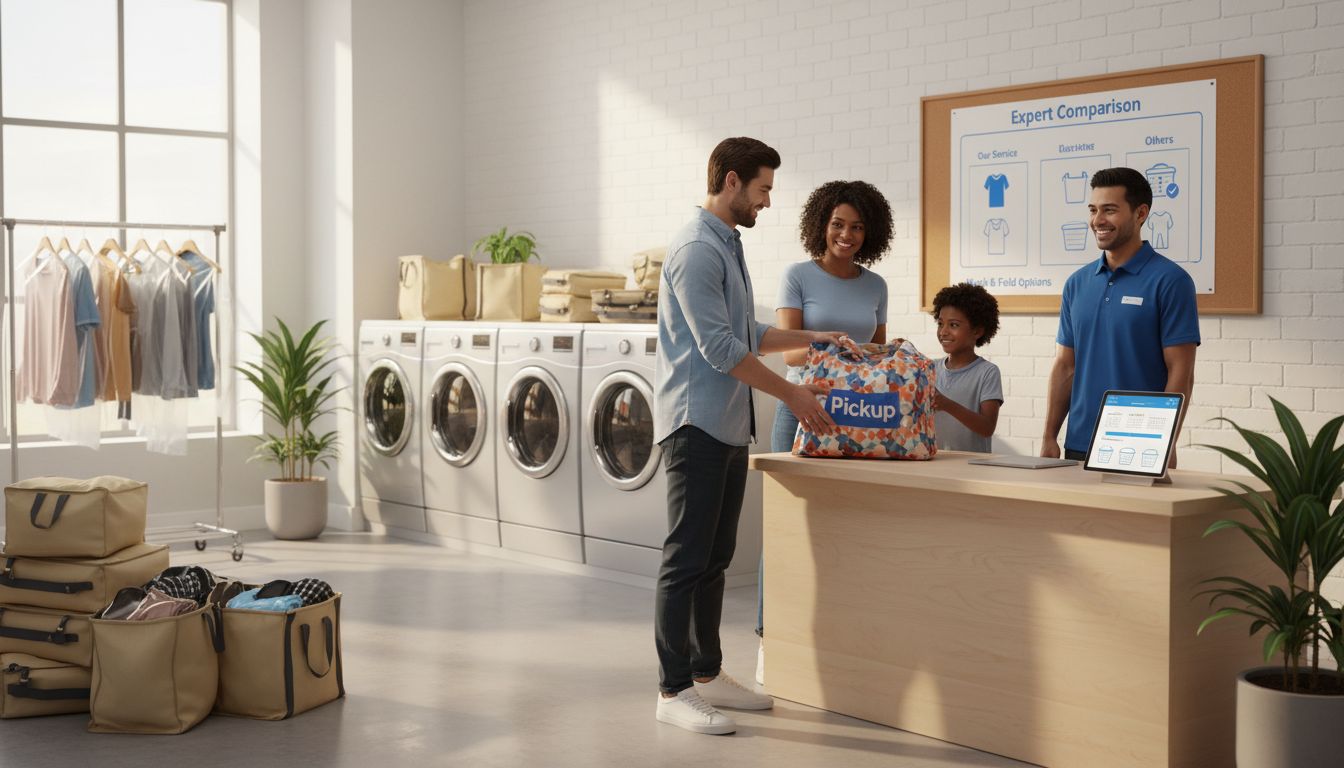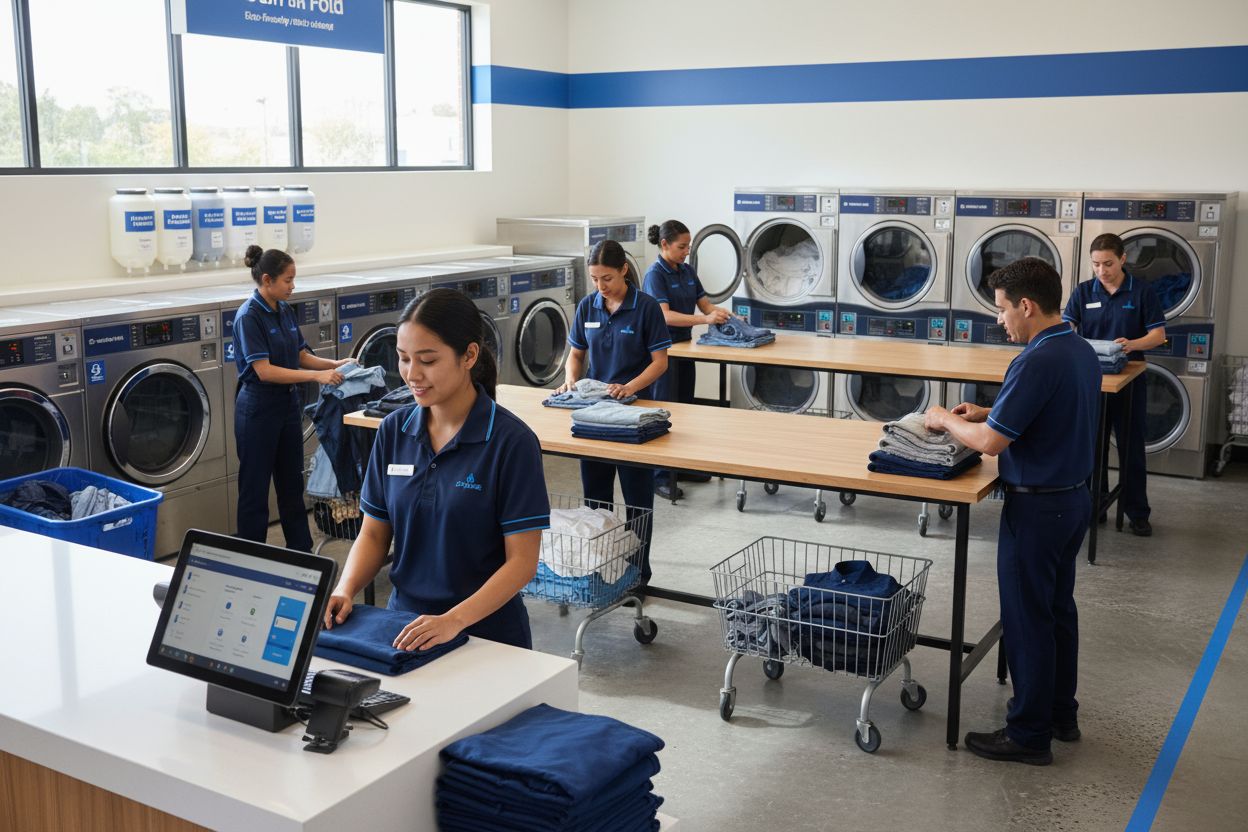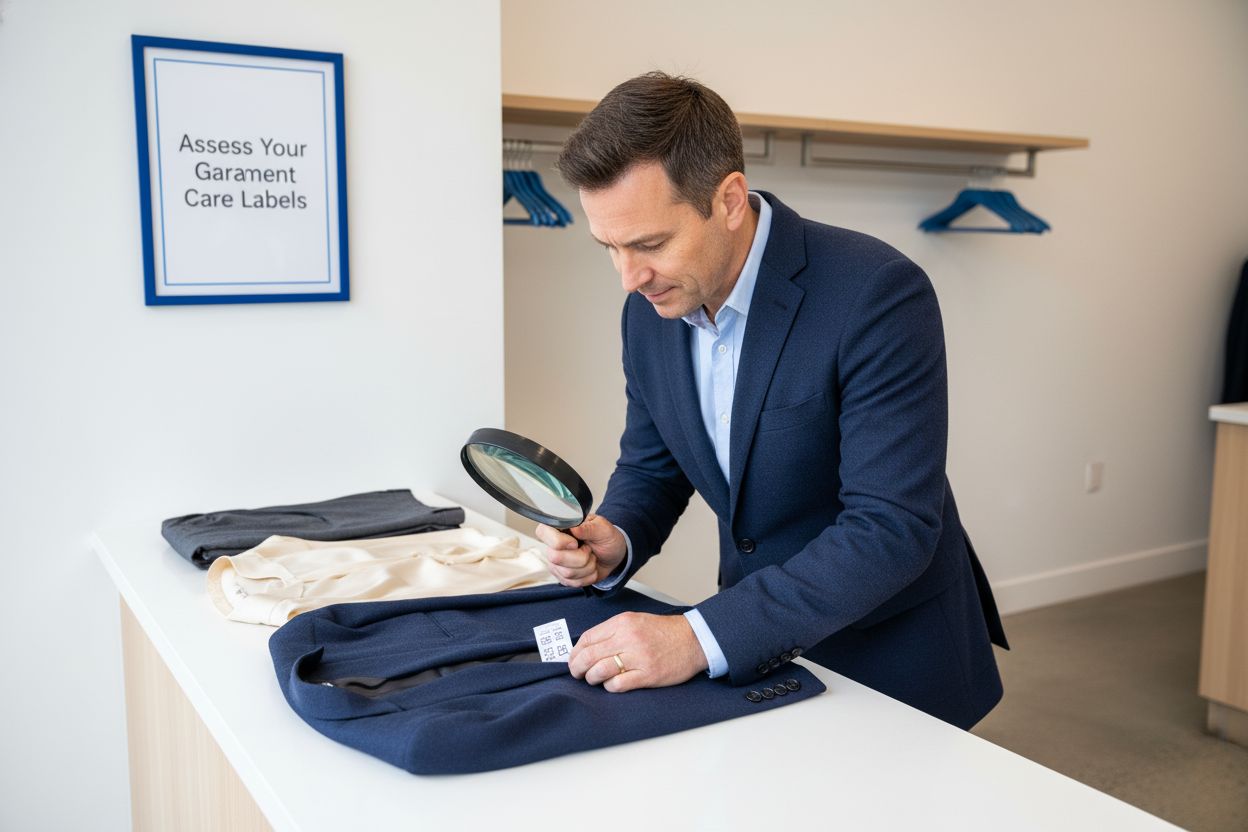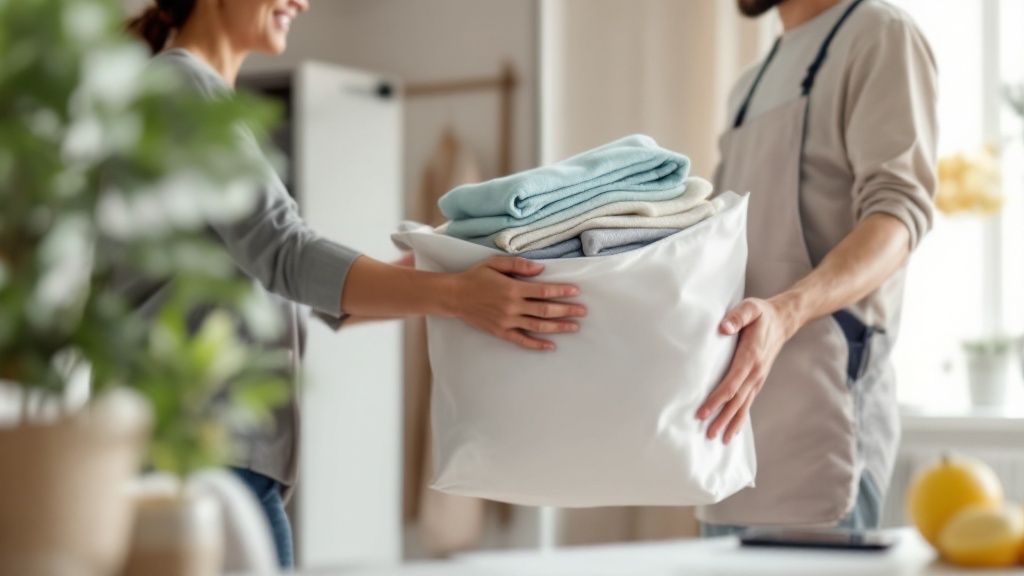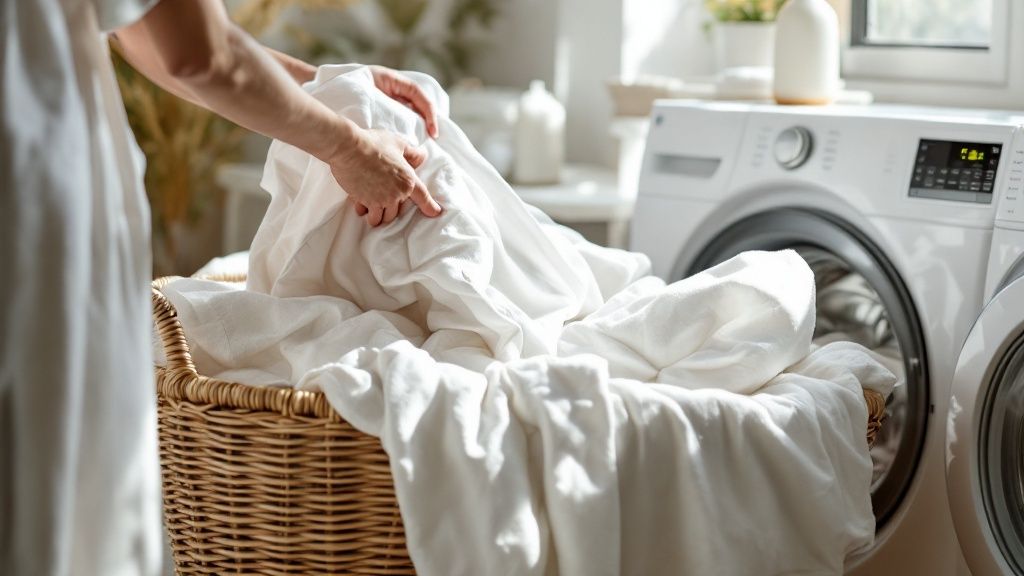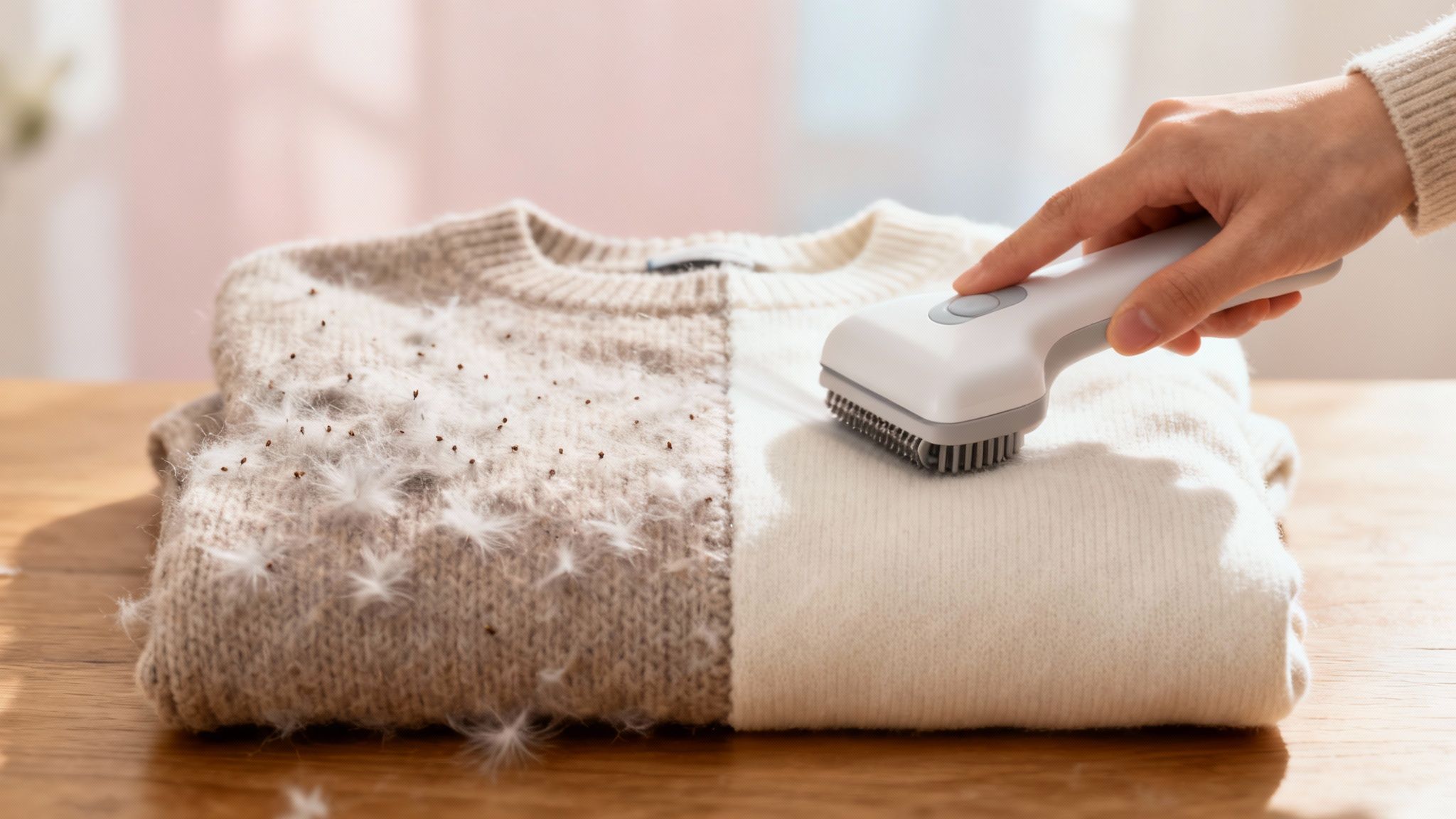Eco Friendly Laundry Softener Guide
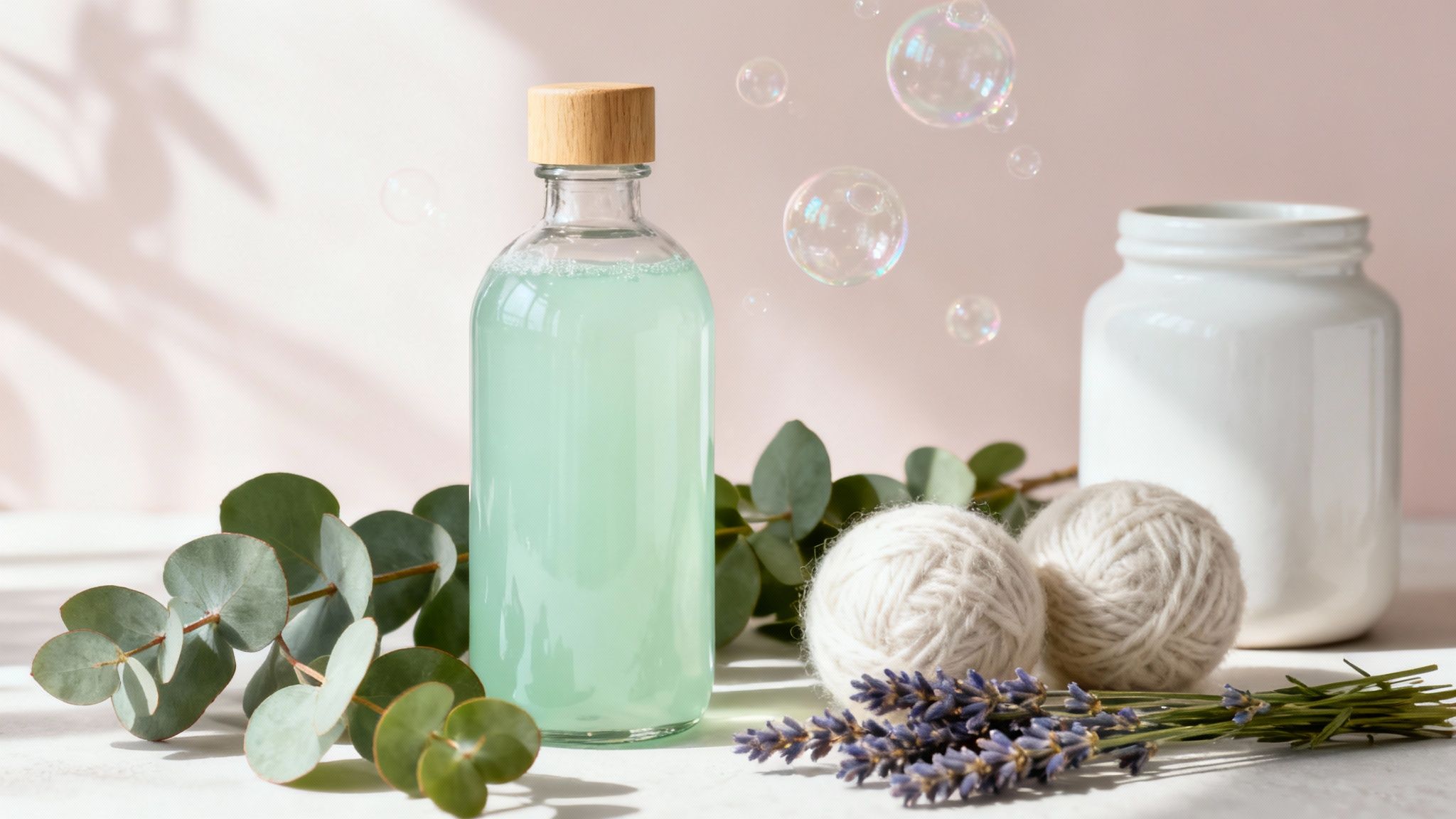
An eco-friendly laundry softener is a much gentler way to condition your clothes, using plant-based, biodegradable ingredients instead of the harsh chemicals you'll find in many conventional brands. It does a fantastic job of softening fabrics and cutting down on static, all while being safer for your family and the planet. Making this simple switch is a surprisingly powerful step toward a healthier, more sustainable laundry routine.
What Defines an Eco Friendly Softener
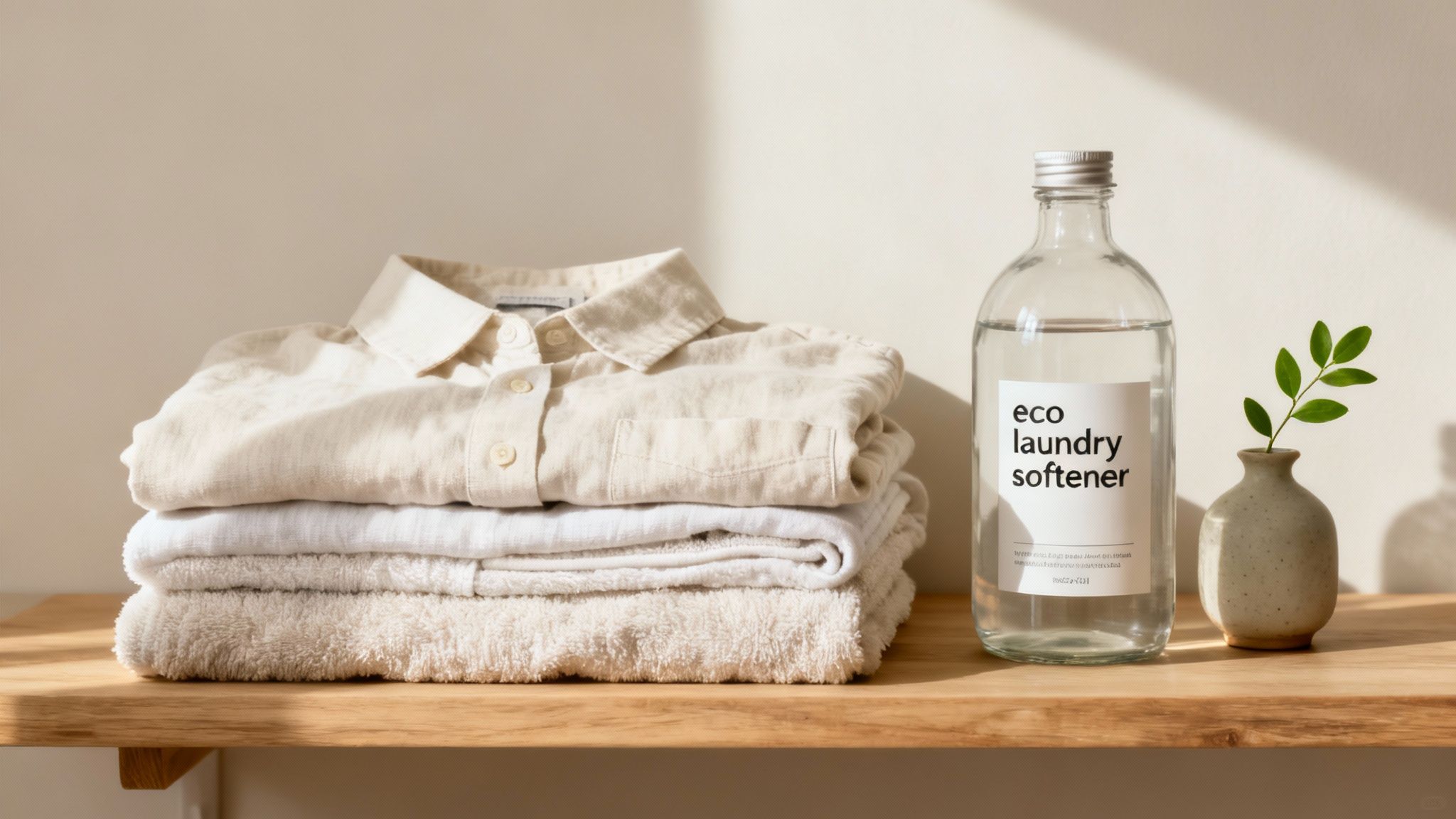
Think of a typical fabric softener as a heavy, synthetic coating for your clothes. It works, sure, but it often leaves behind a residue of petroleum-based chemicals and overpowering artificial fragrances. An eco-friendly laundry softener, on the other hand, is more like a natural moisturizer for your textiles—it works with the fabric fibers instead of just sitting on top of them.
That "eco-friendly" label isn't just a marketing buzzword; it signals a fundamental difference in how the product is made and what it's made of. These softeners are designed from the ground up to minimize their environmental footprint, from the moment they're created to the time they go down the drain.
Core Principles of Green Softeners
So, what really separates these products from the rest of the aisle? It all comes down to a commitment to sustainability, which is built on a few key principles:
- Plant-Based Ingredients: They get their softening power from sources like coconut oil, vegetable glycerin, or essential oils. It’s all about working with nature.
- Biodegradable Formulas: The ingredients are specifically chosen to break down safely and quickly in our water systems, preventing harm to fish and other aquatic life.
- Non-Toxic and Hypoallergenic: You won't find harsh irritants like phthalates, parabens, or synthetic dyes here. That makes them a fantastic choice for anyone with sensitive skin.
To give you a clearer picture, let's break down the key differences.
Conventional vs Eco Friendly Softeners At a Glance
This table offers a quick side-by-side comparison, making it easy to see how these two types of softeners stack up.
As you can see, the choice goes far beyond just getting soft clothes; it’s about what you’re leaving behind on your fabrics and in the environment.
This shift toward greener laundry care is way more than a niche trend. The global demand for sustainable products is completely reshaping the market. The fabric softener industry, valued at around USD 24.8 billion in 2025, is projected to soar to USD 43.8 billion by 2035. A huge chunk of that growth is being driven by people just like you, who are actively seeking out plant-based and biodegradable options.
The main goal of an eco-friendly laundry softener is to deliver soft, static-free clothes without forcing you to compromise on the health of your home or the planet. It’s proof that gentle ingredients can achieve seriously powerful results.
When you choose these alternatives, you're not just getting fluffier towels. You're actively joining a movement toward cleaner waterways and healthier households. To get a better handle on the basics, you might find our guide on what fabric softener is used for helpful. It's amazing how such a small change in your laundry room can create such a positive ripple effect.
Decoding Softener Labels: What to Look For

Walking down the laundry aisle can feel like a pop quiz you didn't study for. Between the long chemical names and vague marketing claims, it’s tough to know what you’re really buying. But the product label is your most powerful tool for choosing a genuinely eco-friendly laundry softener. Think of it as a roadmap—once you know a few key landmarks, finding your way becomes surprisingly simple.
To really get what's in your softener, it helps to learn how to effectively read product labels, just like you would for food. The same logic applies: look past the flashy claims on the front and focus on the actual ingredient list. This simple shift empowers you to make choices that truly align with your health and environmental values.
Green Light Ingredients to Look For
When you scan a label, certain ingredients should jump out as good signs. These are the heroes of an eco-friendly laundry softener, delivering that cozy softness without the nasty side effects. They’re gentle, effective, and come straight from nature.
Keep an eye out for these "green light" components:
- Plant-Derived Surfactants: Words like cocamidopropyl betaine (from coconut oil) or d-limonene (from citrus peels) are great indicators. They signal that the product uses natural agents to soften your fabrics.
- Natural Essential Oils: If a scent is listed as coming from lavender, lemon, or eucalyptus oil, that’s a fantastic sign. It means the fragrance is natural, not cooked up from a synthetic chemical cocktail.
- Vegetable Glycerin: This plant-based ingredient is a wonderful and safe softening agent that’s gentle on both your clothes and your skin.
These ingredients work in harmony with your fabrics and the environment, breaking down harmlessly long after the wash cycle is over.
Red Light Ingredients to Avoid
Just as important as knowing what to look for is knowing what to run from. Many conventional softeners rely on chemicals that can irritate skin and cause serious harm to aquatic ecosystems. Spotting these on a label is an immediate red flag.
Here are the top offenders to steer clear of:
- Quaternary Ammonium Compounds (Quats): Often listed as distearyldimonium chloride or something similar, these are the go-to softening agents in traditional products. They’re notorious skin irritants and are toxic to aquatic life.
- Phthalates: This class of chemicals is used to make synthetic fragrances last longer. They are known endocrine disruptors and don't biodegrade easily, which means they stick around in our waterways for years.
- Artificial Fragrances and Dyes: A vague ingredient simply listed as "fragrance" or "parfum" often hides dozens of unlisted chemicals. Likewise, colorants like "D&C Violet 2" serve no purpose other than marketing and can be a trigger for allergies.
By learning to spot just a few key "red light" chemicals, you can filter out over 90% of the problematic softeners on the market. It’s a simple skill that completely transforms how you shop.
Choosing an eco-friendly laundry softener becomes so much easier once you can quickly tell the good guys from the bad guys. A quick scan of the back label will tell you everything you need to know about whether a product is truly safe for your home and the planet.
The Benefits for Your Home and the Environment
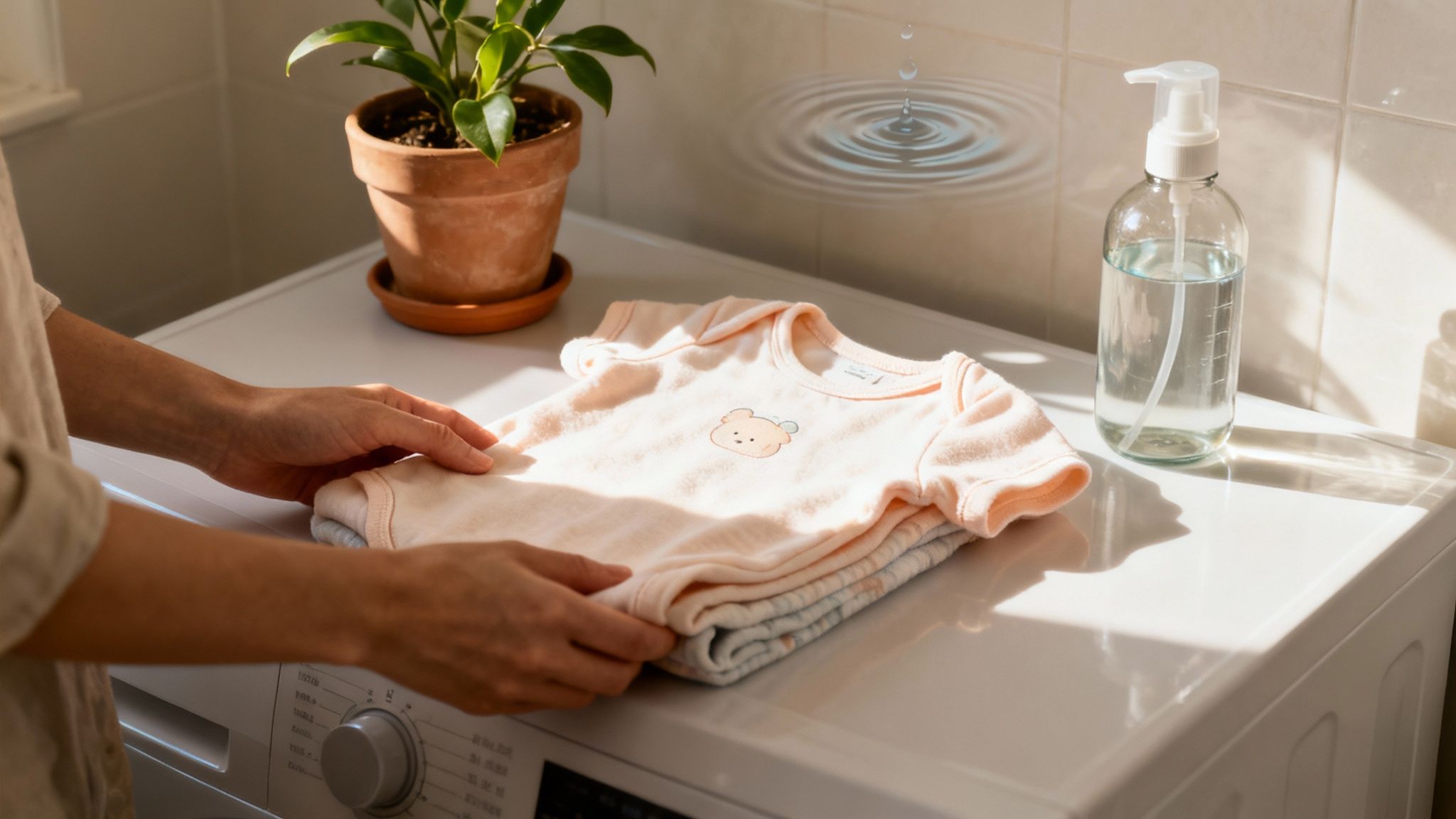
Making the switch to an eco-friendly laundry softener might seem like a small step, but it’s about so much more than just getting softer clothes. It’s one of those simple changes that creates a positive ripple effect, benefiting everything from your family’s skin to the health of our local waterways.
The first thing you’ll likely notice is the difference it makes right at home, especially if anyone in your household has sensitive skin. Conventional softeners are notorious for leaving behind a residue of synthetic chemicals and fragrances that can trigger rashes, eczema, and other allergic reactions. An eco-friendly alternative sidesteps these harsh irritants, making every towel, shirt, and bedsheet noticeably gentler and safer for everyone.
A Healthier Home Environment
When you opt for a softener made with plant-based ingredients and natural essential oils, you're actively creating a healthier space for your family. This is a huge win for households with young children, whose delicate skin is far more susceptible to irritation.
But you're not just dodging skin issues—you're also cleaning up your indoor air quality. Many synthetic fragrances release what are known as volatile organic compounds (VOCs) into the air. A naturally scented or fragrance-free eco friendly laundry softener ensures the air your family breathes is cleaner and free from a whole host of unnecessary chemicals.
By eliminating harsh chemicals from your laundry, you directly reduce your family's daily exposure to potential allergens and irritants, creating a safer sanctuary at home.
The growing demand for these products is a direct response to these health and environmental worries. People are more aware than ever that traditional softeners often contain surfactants that degrade slowly and can be toxic to aquatic life. This has fueled a major market shift toward plant-based formulas and sustainable packaging, a trend you can read more about on Mordor Intelligence.
Protecting Our Planet
The good vibes from this simple switch extend far beyond your front door. Think about it: every time you do a load of laundry, whatever you use eventually washes down the drain and enters our water systems. Choosing biodegradable formulas means they break down harmlessly, preventing a stream of toxic chemicals from polluting our rivers and oceans.
This has a direct and profound impact on aquatic ecosystems. By keeping those nasty ingredients out of the water, you help protect the fish, plants, and other wildlife that are so vulnerable to chemical pollution.
On top of that, eco-friendly brands are usually laser-focused on sustainable packaging and concentrated formulas. This thoughtful approach leads to some key environmental wins:
- Reduced Plastic Waste: Using recycled or compostable packaging helps cut down on the amount of plastic choking our landfills.
- Lower Carbon Footprint: Lighter, concentrated products mean less weight to ship, which requires less energy and reduces greenhouse gas emissions.
- Resource Conservation: These products are designed to work with less per load, which conserves both the product itself and the water needed to rinse it all away.
Every load of laundry really is an opportunity to make a more responsible choice. To dive deeper into green cleaning habits, check out our guide on how to make your laundry routine more sustainable. By choosing a better softener, you’re not just cleaning your clothes—you’re doing your part for a healthier planet.
How to Spot Greenwashing and Find Trusted Brands
When you're standing in the laundry aisle, you're bombarded with buzzwords: "natural," "green," "earth-friendly." It's easy to feel like you're making a great choice, but how can you be sure? In a market overflowing with these claims, telling fact from fiction can feel nearly impossible.
This is where you run into a clever but misleading marketing tactic known as greenwashing. A brand is "greenwashing" when it spends more time and money making itself look eco-friendly than it does on actually minimizing its environmental impact. It's the art of making a product seem much greener than it really is.
You've probably seen it in action. A bottle of laundry softener might be wrapped in earthy, brown packaging adorned with leaves, but a quick flip to the back label reveals a long list of synthetic chemicals. The brand is banking on you making a decision based on the appealing visuals, not the fine print. This is why learning to see past the marketing is so crucial.
Vague Claims Are a Red Flag
Authentic eco-friendly brands are specific. They don't just say they're "good for the planet"—they tell you how. They provide details and evidence to back up their statements. Greenwashing, on the other hand, relies on broad, feel-good terms that offer no real substance. If a product's green claims are fuzzy, be wary.
Here are some classic greenwashing phrases to watch out for:
- "All-Natural": This term is not regulated, which means it can be slapped on almost anything. Remember, arsenic and mercury are "all-natural," but you definitely wouldn't want them anywhere near your laundry.
- "Environmentally Friendly": This is just a vague and unsubstantiated claim without specific proof. What does it mean? If a company can't tell you (like "made from 100% recycled plastic"), it's probably just fluff.
- "Chemical-Free": This one is scientifically impossible—everything, including water (H₂O), is a chemical. It's a misleading term designed to play on our fears of the unknown.
For a deeper dive into decoding what’s really in your household products, this guide on reading labels for non-toxic home products is a fantastic resource.
Look for Third-Party Certifications
So, what's the most reliable way to cut through the noise? Look for third-party certifications. Think of these seals as a trusted expert vouching for a product's integrity. When you see one on a bottle of eco-friendly laundry softener, it means an independent organization has rigorously tested the product and verified that it meets strict health and environmental standards.
A third-party certification is your shortcut to confidence. It confirms that a brand has gone through a demanding verification process to prove its eco-friendly claims are legitimate and not just clever marketing.
These seals do the hard work for you, taking the guesswork out of your purchase.
Here are two of the most respected certifications to look for on laundry products:
- EPA Safer Choice: This label is managed by the U.S. Environmental Protection Agency, and it's a big deal. It means that every single ingredient in the product has been reviewed for potential human health and environmental effects. It's your guarantee that the product contains safer ingredients without sacrificing quality or performance.
- ECOLOGO: Products with this seal have been certified for reduced environmental impact based on their entire lifecycle. This certification looks at everything from the raw materials and manufacturing process to the packaging, ensuring a holistically sustainable product from start to finish.
Easy and Effective DIY Laundry Softeners

If you love a simple, budget-friendly, and completely transparent approach, making your own eco-friendly laundry softener is surprisingly easy. You can get wonderfully soft clothes using common household staples, giving you total control over every ingredient that touches your family's skin.
Going the DIY route means you can skip scrutinizing labels altogether. It’s a direct path to a non-toxic laundry routine and the ultimate way to ensure your fabric softener lines up perfectly with your health and environmental goals.
The Power of White Vinegar
Distilled white vinegar is hands-down the most effective and affordable natural fabric softener out there. Think of it as a clarifying rinse for your clothes. It works by breaking down and washing away the gunk—like mineral deposits and detergent residue—that makes fabrics feel stiff and scratchy.
And don't worry about the smell! The vinegar scent completely vanishes during the rinse cycle, leaving your laundry just plain fresh and clean. All you have to do is add ½ cup to your washing machine’s fabric softener dispenser at the start of the wash. It’s safe for all machines, including high-efficiency (HE) models, and it even helps keep your washer clean as a bonus.
To see how this household staple works with another laundry powerhouse, check out our guide on washing clothes with baking soda and vinegar.
Wool Dryer Balls: The Reusable Alternative
If your main goal is to soften clothes in the dryer while cutting down on static and wrinkles, wool dryer balls are a total game-changer. These tightly felted wool balls tumble around with your clothes, creating space that allows hot air to circulate more efficiently.
This improved airflow can slash drying time by 10-25%, saving you energy and lowering your utility bills with every single load. Unlike single-use dryer sheets, a good set of wool dryer balls can last for over 1,000 loads, making them an incredible long-term investment.
Using them couldn't be simpler: just toss three to six balls into the dryer with your wet laundry and let them do their thing. For a little extra fragrance, you can even add a few drops of your favorite essential oil directly onto the balls before you hit start.
A Quick Look at Your Options
Deciding between these popular DIY methods often comes down to your primary laundry goal—softening in the wash or the dry cycle. Here’s a quick comparison to help you choose.
Comparing DIY Softener Options
DIY MethodPrimary BenefitBest ForCostWhite VinegarRemoves residue, softens fabricsAll-purpose softening for any loadVery LowWool Dryer BallsReduces drying time & staticFluffing towels, sheets, and daily wearLow (one-time)DIY Scented VinegarSoftens with a light, natural scentAdding a custom, chemical-free fragranceLow
Each of these options offers a fantastic, eco-friendly alternative to commercial softeners. Whether you prioritize cost, convenience, or a touch of natural fragrance, there's a DIY solution that fits your needs perfectly.
Simple DIY Scented Softener Recipe
For those who miss the light scent of commercial softeners, it's incredibly easy to create your own scented version with just two ingredients. This recipe delivers all the softening benefits of vinegar with a personalized, natural aroma.
What You'll Need:
- A large glass jar or bottle for storage
- Distilled white vinegar
- Your favorite essential oil (lavender, lemon, or eucalyptus are great choices)
Instructions:
- Fill your glass container with distilled white vinegar.
- For every cup of vinegar, add 15-20 drops of essential oil.
- Shake the container well before each use to mix the oil.
- Add ½ cup of your scented mixture to the fabric softener dispenser.
This simple, effective recipe gives you all the softening power you need without any of the harsh chemicals. It's the perfect eco-friendly laundry softener for a truly natural clean.
How We Support Your Eco-Friendly Laundry Choices
Making the switch to an eco-friendly laundry softener is a great move, and we believe that commitment shouldn't end just because you’re using a laundry service. We’ve set up Columbia Pike Laundry to fully support your green choices, so you never have to pick between what's convenient and what's right for the planet.
Our modern, high-efficiency (HE) washing machines are built to work perfectly with all kinds of natural softeners. Whether you bring in a plant-based liquid, some softener pods, or even your own DIY vinegar mix, our equipment is ready for it. You’ll get the gentle, effective softening you want without any headaches.
Our Commitment to a Greener Clean
Beyond just being compatible with your products, we’re dedicated to sustainability in everything we do. We know that small, consistent actions add up to a big impact, which is why we've invested in equipment and practices that reflect an eco-conscious mindset.
- Energy-Efficient Machines: Our washers and dryers are top-of-the-line, designed to use significantly less water and electricity with every load. That means a smaller carbon footprint for your laundry day.
- Support for Reusable Options: If you're a fan of wool dryer balls, you're in luck. Our dryers create the perfect environment for them to do their thing—softening clothes naturally and even cutting down on drying time.
We truly believe that a professional-quality clean can—and should—go hand-in-hand with environmental responsibility. Our goal is to offer a service that not only frees up your time but also helps you stick to the sustainable lifestyle you care about.
Got Questions About Natural Softeners? We've Got Answers
Switching over to an eco-friendly laundry softener for the first time usually brings up a few questions. It’s totally normal to wonder if these greener options can actually hold their own against the conventional products you've been using for years. Let's tackle some of the most common concerns so you can feel great about your choice.
One of the biggest questions I hear is, "Do they really work as well?" The answer is a definite yes. Today's formulas aren't like the weak eco-products of the past; they use powerful, plant-based ingredients that are fantastic at softening fabrics and cutting down on static cling. Best of all, they do it without leaving behind that waxy chemical residue common with synthetic brands. Your clothes will feel just as soft and smell genuinely fresh.
Another hot topic is all about DIY solutions—especially good old white vinegar.
Is White Vinegar Really Safe for My Washing Machine?
Absolutely. A half-cup of distilled white vinegar per load is completely safe for any washing machine you can throw at it, including the newer high-efficiency (HE) models. It's a brilliant natural softener, and it even has a hidden superpower: it gently cleans away the gunk and soap buildup that can linger inside your machine, helping it run better over the long haul.
A lot of people also get hung up on the cost. While some boutique eco-brands might have a higher price tag, many are priced right alongside the big names. Plus, since many of them are concentrated, you end up using less per load, which often makes them a better value.
And when you look at options like vinegar or reusable wool dryer balls, the savings are undeniable. A single set of wool dryer balls, for example, can keep on tumbling for over 1,000 loads. Making a sustainable choice doesn't have to break the bank—in fact, this simple switch can save you a surprising amount of money over time while being kinder to the planet.
Ready to pair your favorite eco-friendly softener with a professional, sustainable clean? At Columbia Pike Laundry, our high-efficiency machines are perfect for all your green laundry needs. Schedule your first pickup today and let us handle the rest.
Popular Blog Articles

Meet the Author
Daniel Logan didn’t start CPL because he loved laundry. He started it because his family was drowning in time debt, and laundry was one of the biggest weights.
Mornings were chaos with two kids under 5. Evenings felt like catch-up. And weekends? Gone to sorting socks and folding piles.
He knew his story wasn’t unique. So he built a business that gave families like his just a little bit of breathing room one load at a time.
With no laundry experience but deep tech skills, Daniel rolled up his sleeves, doing every job himself while building systems that turned it into a modern laundry service that saves customers time, simplifies their lives, and delivers reliability they can count on.
That’s where CPL began. Not from a playbook, but from pain. From one dad trying to buy back time: for himself, and for every household like his.

